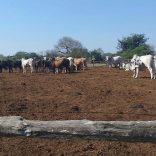Mozambique: Cashew sector growth transforming community livelihoods, says Agriculture Ministry
Mozambique: EU to support another 10,000 farmers

Photo: European Mission in Mozambique on Twitter / @EUinMoz
The European Union (EU) will support an additional 10,000 Mozambican farmers to produce cereals to help the country tackle the global food crisis aggravated by the war in Ukraine.
The measure will result from an additional €15 million allocated to t the PRomove AgriBiz program , via an agreement signed in Maputo on Thursday.
READ: PROMOVE Agribiz presents intermediate results and looks to the future with confidence | Mozambique
FAO Rep Mr.@FAOCoelhoDaSil1 & 🇲🇿 Cereals Institute DG Mr Mohamad Valá signing an agreement on a EU🇪🇺 action (23 million EUR) to address the food security crisis caused by Russia-Ukraine conflict & stimulate sustainable food production in🇲🇿.#PROMOVEAgribiz assisting people in need pic.twitter.com/DJpelvSg8s
— FAO Mozambique (@FAOMozambique) November 4, 2022
“These funds will allow us, from this agricultural season forward, to extend our current support to a greater number of farmers, helping them to produce more, in a more sustainable way, so that they can face future crises and, especially this year, mitigate the impact of the dramatic increase in production costs,” said Antonino Maggiore, EU ambassador to Mozambique.
Promove AgriBiz already supports 22,000 farmers and the reinforcement announced yesterday represents an increase of 45%.
Ambassador Maggiore was speaking at the signing ceremony of the support in partnership with the Food and Agriculture Organization of the United Nations (FAO) and the Cereals Institute of Mozambique (ICM).
“The new funds allocated will help to create the strategic food reserve, in accordance with the ICM’s mandate. The objective is to support the production of 16,000 tonnes of maize and 4,000 tonnes of beans,” the EU said in a statement.
The aid is part of the €23 million announced for Mozambique in September, as part of the European Development Fund’s €600 million global package for food and production aid in the most vulnerable countries in Africa, the Caribbean and the Pacific.
In Mozambique, the EU foresees that the disruptions in the production and trade of cereals and fertilisers may lead to shortages and a likely rise in prices with a negative impact on food security for the poorest groups of the population.
Subsistence agriculture is the main source of food for the majority of the Mozambican population, which is currently estimated at around 31.6 million people, of whom around half are under the age of 18.
Parceria da UE e da FAO c/ o Gov Moçambique p/ fazer face à crise segurança alimentar causada pela guerra de agressão à Ucrânia
Acordo assinado esta manhã entre Inst Cereais Moç e FAO, visa contribuir p/ abastecer as reservas alimentares estratégicas nacionais e criar resiliência pic.twitter.com/N8D32gKv7f— European Union in Mozambique (@EUinMoz) November 4, 2022












Leave a Reply
Be the First to Comment!
You must be logged in to post a comment.
You must be logged in to post a comment.